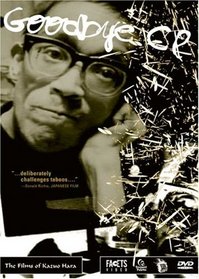| Director: Kazuo Hara Genres: Indie & Art House, Special Interests, Documentary Sub-Genres: Indie & Art House, Special Interests, Documentary Studio: Facets Format: DVD - Black and White,Full Screen - Subtitled DVD Release Date: 04/24/2007 Original Release Date: 01/01/1972 Theatrical Release Date: 01/01/1972 Release Year: 2007 Run Time: 1hr 22min Screens: Black and White,Full Screen Number of Discs: 1 SwapaDVD Credits: 1 Total Copies: 0 Members Wishing: 2 MPAA Rating: Unrated Languages: Japanese Subtitles: English |
Search - Goodbye CP on DVD
  | Goodbye CP Director: Kazuo Hara Genres: Indie & Art House, Special Interests, Documentary UR 2007 1hr 22min Maverick documentary filmmaker Kazuo Hara once again criticizes the mores and customs of Japanese society in this unsentimental portrait of adults with cerebral palsy (CP). Focusing on how the CP victims are generally igno... more » |
Larger Image |
Movie DetailsSimilar Movies
|
Movie ReviewsDisabled in a Modern Country Daitokuji31 | Black Glass | 06/16/2007 (4 out of 5 stars) "The subject matter of Hara Kazuo's films has always been quite fascinating. In his 1974 film Extreme Private Eros Love Song 1974 he followed his ex-girlfriend Takeda Miyuki to Okinawa in order to get over his feelings for her by filming her daily life there. In 1987 he filmed The Emperor's Naked Army Marches on which concerns Okuzaki Kenzo a World War II veteran who tracks down fellow veterans to make them confess their war crimes. However, the main subject of Hara's Goodbye CP never ran off to Okinawa to form relationships with lesbians or African American soldiers nor did her ever shoot ball bearings at the Emperor with a sling shot. In fact, Yokota Hiroshi never walked on his own two feet due to his disability caused by cerebral palsy.
Apparently in 1972 Hara, then twenty-seven, was hired by Green Lawn, a Japanese group for sufferers of cerebral palsy, and the Japan CP Association to make a documentary film to show "healthy" people the lives of those who cannot control there own bodies. Although Hara spends time filming a number of people suffering from cerebral palsy, the film mainly focuses on the above mentioned Yokota Hiroshi whose disease prevents him from walking on his own two feet. Instead the man walks on his knees because it is faster than a wheelchair. In many films such scenes would be used to show a man trying to overcome the odds fate has set against him. However, in this film the viewer sees a man who is unable to keep his glasses on when he "walks" and who is terrified crossing the streets because he might be killed by an oncoming car. However, instead of wallowing in pity or trying to gain the pity of others, Yokota and his friends want only to be treated as human beings. The human essence within their crippled bodies is what Hara tries to bring to the fore and he does so through questions concerning their sex lives, etc. Another incredible part of the film deals with another sufferer of cerebral palsy who, inspired by Hara, picks up a camera himself to take photos of "healthy" people. Through the lens of the camera he is able to stare at those who he once feared were staring at him because of his disability. However, instead of being stared back in return, the man's camera is avoided. This avoidance is echoed in the treatment of Yokota who, although he is on his knees before them handing out pamphlets is generally ignored by the populace who just stare straight ahead instead of acknowledging his presence. It goes without saying that Goodbye CP does not make for an enjoyable film watching experience, but instead it gives the viewer an early dose of one of Japan most controversial documentary film directors while laying bare the reactions of a general populace towards the disabled." |





